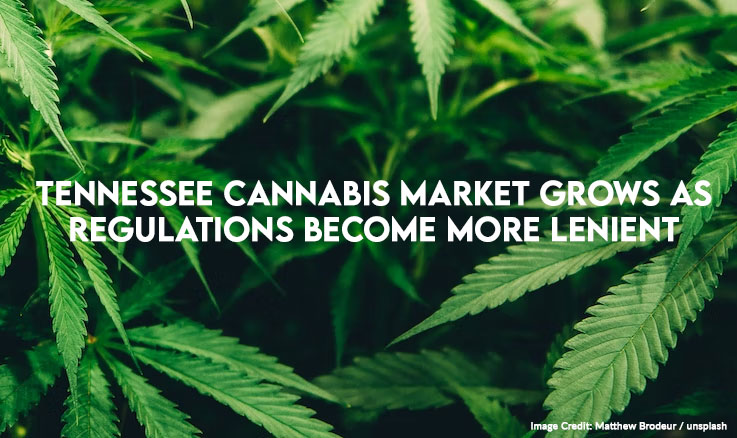Image Credit: Matthew Brodeur / unsplash
The Tennessee Conservative [By Jason Vaughn] –
The cannabis industry and culture have continuously grown in the last five years as regulations have changed in the state.
Cannabis legislation in Tennessee has boiled down to terminology differences and seemingly minute concentrations of the substances. Millions of dollars in state tax revenue and countless jobs in the industry have caused a back and forth, though, regarding the legislation.
The term “cannabis” generally refers to the products from the Cannabis Sativa plant. “Cannabinoids” are most common in the industry, which refers to the numerous byproducts from the plant that can be chemically isolated – tetrahydrocannabinol, THC, and cannabidiol, CBD, being the most popular.
There are potentially hundreds of cannabinoids being studied by the cannabis industry and utilized in products, but these are the most popular.
Tennessee passed a law in May 2017 that defined “industrial hemp” as any production less than 0.3% Delta-9 THC from a Cannabis sativa plant. After the passing of the bill, legal growing and processing of these hemp plants was allowed with proper licensing within the state. The hemp industry has since boomed across the state of Tennessee.
Despite the limitations on the Delta-9 THC in these products, there is no CBD, Delta-8, Cannabigerol, CBG, or other cannabinoid regulations within the products.

Possession of cannabis that exceeds these defined concentrations can result in A Class A misdemeanor, which can be a fine of up to $2,500 or a year of jail time. In early 2016, Nashville and Memphis passed legislation to decriminalize cannabis possession in minimal amounts, less than half an ounce, to a fine of $50 and no more than 10 hours of community service. Since then, in 2017, the legislation was blocked by state regulation by Governor Bill Haslam.
In May 2021, there was another breakthrough in the state’s market, the passage of another cannabis legislation. A state medical cannabis commission, which consists of local medical professionals, was created by the bill. An exception was made regarding medical cannabis usage CBD oil that contains 0.9% THC or less for those who experience life-threatening or fatal conditions such as seizures, Alzheimer’s, cancer, and more. Written permission from a medical professional is required for an individual to be allowed to do so.
As of early 2022, there were multiple cannabis-related bills up for the year. A bill to enact the “Free All Cannabis for Tennessee Act”, in March 2022, did not make it out of the senate or house subcommittees. The bill was created in hopes of recreationally legalizing and regulating cannabis sales for those over 21 years of age and placing a 15% tax on all marijuana sales. If passed, the bill was expected to account for $65 million in state tax revenue in the first year and around $130 million in the years to come.
A bill was introduced to ban the sale of Delta-8 THC products less than a week later. The ban was predicted to cause at least a $2 million net decrease in state revenue per year and was quickly amended to instead regulate and tax Delta-8 THC instead.
Delta-8 THC products would be limitedly sold to adults over 21 and require testing in facilities producing these products. The bill would also place a 5% tax on these products. The bill, however, was never discussed or voted on within the legislative period.
As of now, that is the most recent legislative action on cannabis within the state of Tennessee, however, it lacks consideration of the already present cannabis market and interest.
On June 8, a cannabis live chat was hosted by Big Plan Holdings in Nashville. This brought together a panel of executives in the cannabis market.
CEO of Big Plan Holdings and founder of Grassroots Cannabis, Josh Joseph, stood on the panel offering a perspective from his time running Grassroots Cannabis, which is a multi-state cannabis producer and seller.
David Belsky, the founder of FlowerHire, accompanied Joseph. FlowerHire helps hire higher-level management in the cannabis industry. Jordan Reed, a former NFL player and founder of BPH Legacy, which focuses on diversity and equity in the cannabis industry, also accompanied them.
Cannabis business from a national level was the primary focus of the panel, with examples from states with legalized cannabis being used. Regulations once a state passes legislation to legalize cannabis was covered. They also discussed how that changed the market for cannabis.
“The state enacts legislation, and that provides you a guideline of exactly where you can be in terms of how far you can be from a church or a mosque or a synagogue or a public playground or a swimming pool,” Joseph told Mainstreet Nashville. “(The state gives) the local cities and towns and municipalities the ability to opt-in or opt-out to a candidate’s program … then those local municipalities, if they opt-in, have the ability to add to restrictions that the state has put in place.”
The cannabis industry is continuously growing, so while this legislation may be way off for Tennessee, a specialized workforce and access to arable land is required as many producers control the entire process from plant to product.
“What I’ve seen from an economic impact standpoint is a lot of cannabis cultivation is really not done in city centers. It’s done downstate, in the country, areas of the world that have been left behind by globalization,” Belsky said. “Facilities that have literally had nothing in them for 20 or 30 years and communities with no jobs except for Walmart now have hundreds of jobs in a production facility. It’s really amazing to see kind of the rebirth of middle America through cannabis jobs.”
This event in Nashville was held in hopes of sparking many talks to help educate people about the cannabis industry nationally and to provide more awareness about cannabis products.
“The train has left the station. Cannabis is here to stay,” Joseph said. “It’s a booming industry that creates jobs, creates tax revenue, and creates the ability for folks to live a healthier lifestyle.”

Traditional cannabis is yet to be legalized in Tennessee, but the cannabinoid industry is running strong and legally throughout the state. Consider It Flowers is one of the best examples that can be seen within the state.
Consider It Flowers was founded by Dexter and Kelsey Palmer in 2020. During the COVID-19 lockdown, this couple began making edibles using high concentrations of hemp flowers and delivering them to their friends.
They decided to create this delivery-based cannabis business. Since then, the business has grown and covers a 20-mile radius of Nashville’s city center. They offer high-quality products that contain cannabinoids all derived from legal and locally grown medical-grade super hemp, calling it “recreational hemp.”
“Our goal is to offer both a friendly, professional service and products that our customers can rely on for specific effects. We’re offering custom blends and can tell the customers exactly what’s in each product and how much is an appropriate dose,” Kelsey Palmer told Mainstreet Nashville. “We’re educating our customer base and in the process normalizing the use of cannabis. We’re letting people know that cannabis can be fun and health giving.”
The importance of testing and ensuring the products they released was emphasized by the couple. Making sure they meet the ingredients and specifications found on the packaging was necessary. Dosage recommendations were also found on the packaging and further explanation of the expected effects of cannabinoids can be found on their website.
The business aims to reach people new to the cannabis industry. It is also utilized by those who are turned away by the stigma of a smoke shop or who would alternatively turn to illegal drug deals.
“I think the coolest thing is that we’re allowed to do this now in Tennessee. For the longest time, not having legal cannabis products or services has criminalized a lot of people in this state,” Dexter Palmer said. “Two years after our launch, we are still so excited to be Nashville’s own recreational hemp delivery service providing legal cannabis and THC products to our community.”
Dexter and Kelsey’s business has not been at risk even with the proposed regulation of Delta-8 THC, as they strictly follow testing guidelines for their products.
The shift seemingly coming to the cannabis industry in Tennessee is a broader medical cannabis exemption. The Tennessee Medical Cannabis Commission held a meeting on August 26, which may hint at future medical marijuana legalization in Tennessee.


About the Author: Jason Vaughn, Media Coordinator for The Tennessee Conservative ~ Jason previously worked for a legacy publishing company based in Crossville, TN in a variety of roles through his career. Most recently, he served as Deputy Director for their flagship publication. Prior, he was a freelance journalist writing articles that appeared in the Herald Citizen, the Crossville Chronicle and The Oracle among others. He graduated from Tennessee Technological University with a Bachelor’s in English-Journalism, with minors in Broadcast Journalism and History. Contact Jason at news@TennesseeConservativeNews.com



One Response
The criminalization of THC was by and for lucifer.
Genesis 1:29
And God said, Behold, I have given you (for your judicious responsible use) every EVERY!! herb bearing seed, which is upon the face of all the earth, and(also) every tree, in the which is the fruit of a tree yielding seed; to you it shall be for meat.
Titus 2:6
Young men likewise exhort to be sober minded.
God didn’t design us to smoke ANYTHING.
What we NEED is our God given herbal FREEDOM restored!! NOT more gunmint regulation/taxation.
Yes, there’s ALWAYS gonna be misusers/abusers of whatever but that’s ZERO reason to prohibit FREEDOM!!